2002: Divinity School
God’s work in progress
First divinity class reflects on a life-changing three years
By Kerry M. King (’85)
Published in the June 2002 edition of Wake Forest Magazine
Pride may be one of the seven deadly sins, but you can forgive Bill Leonard for feeling just a bit of it. Samuel Wait attracted just sixteen students when he opened Wake Forest Manuel Labor Institute in 1834. No one showed up when the School of Law opened in 1894. But twenty-four students enrolled when the Wake Forest Divinity School at long-last opened its doors in 1999, and twenty graduated May 20.
“I’m very proud of them and grateful that they gave us a chance,” said Leonard, a prominent church historian who was named the school’s first dean in 1996 and spent the next three years preparing for its opening. “They took a risk to come here and they stayed with us. They invested themselves completely in shaping the school and affirming and assessing where we are and what we need to do. More importantly, they want us to be better than we are now.”
Most of the graduates are planning to seek ordination through their “home” church or denomination. Reflecting the school’s ecumenical nature, they represent a variety of faith traditions, including Baptist, Moravian, Presbyterian, and United Church of Christ. Some enrolled knowing precisely what they wanted to do after graduation; for others, the school’s emphasis on “vocational discernment” has helped them determine how to best serve God. Most are pursuing careers in parish ministry, while others are planning to work in social agencies or as chaplains in hospitals or retirement communities. Several are considering Ph.D. programs to prepare for teaching careers; one is going to law school.
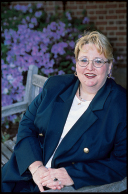
“People asked me if I enjoyed it,” says Jennie L. Hemrick, who left her job as director of the Family Court Unit for the Forsyth County District Attorney’s Office to enroll with the first class. “No, I didn’t enjoy it—it was a lot of hard work — but there was a joy in it. God had been calling me to ministry for twenty-five years. I feel a sense of urgency now to get out and do ministry.” A long-time advocate for victims of domestic violence, Hemrick is seeking ordination in the Presbyterian Church (USA) and hopes to pastor a church and help other church leaders respond to issues of domestic violence.
Hemrick and her classmates agreed that the past three years was not so much about learning what to do as it was about discovering who they are.

“It’s prepared us not just with the ‘tools of the trade,’ but helped determine our ministerial identity,” said another member of the class, David Brown, a 1999 graduate of Clemson University from Marietta, South Carolina, who plans to become a Baptist minister. “Knowing who you are as a minister empowers you to do ministry as the person you are rather than doing it out of a manual.” Brown said a mission trip to New York City has led him to consider pasturing—or starting—a church in a large city, something he had never considered before.
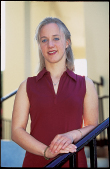
Kristin Gerner, who enrolled immediately after graduating from Catawba College in Salisbury, North Carolina, described the experience as “boot camp for the soul” in terms her military father could understand. “It put words to my faith,” she said. “My faith is completely different. It is real to me now. It has broadened the scope of my relationship with God.”
Both Gerner and Megan Ramsey (’99) from Brentwood, Tennessee, had originally considered attending medical school before enrolling in the Divinity School, and both are now enrolling in clinical pastoral education programs, Gerner at Wake Forest School of Medicine and Ramsey at Emory Healthcare in Atlanta, Georgia. Both hope to be chaplains in a hospital or Hospice setting, and both are seeking ordination, Gerner through the United Church of Christ and Ramsey through the Presbyterian Church (USA).
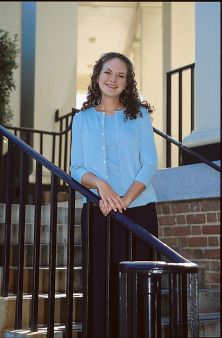
Ramsey, who was attracted to the Wake Forest Divinity School partly as a result of having classes with Leonard and professor Frank Tupper as an undergraduate, said the program was rigorous and challenging, academically and emotionally, combining graduate level work with the spiritual side of worship. “A lot of it was figuring out how to integrate theological learning with the practical aspects of ministry, and how our gifts in both areas will come together to serve God,” she said.
Elizabeth Parker was an elementary school counselor in Winston-Salem when she applied to the Divinity School. “I didn’t expect it to be such a life-changing experience,” said Parker, who had planned to return to counseling, but now wants to eventually pastor a Baptist church. “It was much more than taking classes. It was not an 8- 5 kind of life; it was with you all the time. Frank Tupper was right when he said that divinity school was about wrestling with those 2 a.m. questions—Why is there evil in the world? Why do people suffer?”
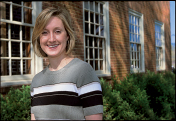
For Parker and the others in the class, their Divinity School experience started with a mixture of anticipation and apprehension on a hot summer morning in August 1999 when they met their classmates and professors in the Wait Chapel parking lot to leave for a retreat at Brown’s Summit, near Greensboro, North Carolina. “It was just twenty-four students and six faculty members,” remembers Gerner. “We didn’t know if we would love each other or hate each other.”
Leonard had planned to serve a traditional Moravian Love Feast at the retreat with buns and coffee and had already prepared a large urn of coffee to take with them; most every student in the class remembers that the urn turned over in the truck of Leonard’s car, drenching everything in the trunk. Although some may have wondered if that was a bad omen, the retreat went well and most students remember it as one of the highlights of their three years and an important bonding experience in building a sense of community among the students and faculty. Gerner and others said the class has been remarkably close, laughing, crying, sharing, and worshiping together from the retreat through senior projects in April.
If going to divinity school is acting on one’s faith, then going to a school with no history, no students, and no track-record may have been an even greater act of faith. But for those who came, the newness of the school was appealing, an opportunity to do something that no one else had done, a risk worth taking. Most say they were attracted because of the vision articulated by Leonard and director of admissions Scott Hudgins: a school that was “Christian by tradition, ecumenical in outlook, and Baptist in heritage” to prepare students for the changing face of religion today. And it would be situated within a university-setting, the first university-based seminary in the country to start without a formal denominational affiliation.
“The door to ministry is still through denominational doors, but those doors are increasingly swinging doors,” Leonard says. “Six to eight Protestant denominations now recognize each other’s ordinations, a change from just a few years ago. We are in a permanent transition. These students live between the old world and the new one and changing traditions. They have multiple choices that previous generations did not.”
Hemrick said the school has prepared the graduates well to meet those challenges. “Every faith tradition is represented here, and I value greatly the opportunity I had to hear and learn about those other traditions,” she said. “The caliber of education (we received) isn’t only in the classroom, but also what we learned from each other.” While all the students praised the school for encouraging diversity, several cautioned that diversity includes conservative as well as liberal views. “All the views need to be heard,” Hemrick said. “I can learn from those who are more conservative than I am, and they can learn from me.”
Elizabeth Parker said she learned a lot about herself and her own tradition. “In order to claim myself as a Baptist, I had to examine that tradition by holding it up to other traditions,” she says. “Now I can truly, fully claim myself as a Baptist, and I could not do that before.”
While Leonard says the last three years have gone rapidly, the ten years—or 165 years, depending on how you look at it—leading up to the opening of the school would have strained the patience of Job. The North Carolina Baptist State Convention opened Wake Forest in 1834 to educate young men for the ministry, but by the school’s fourth year, most of the young men enrolling had other careers in mind. In 1945, the Convention asked Wake Forest to establish a professional school of theology, but the idea was quickly forgotten as energy and resources went toward building a new campus and relocating the College to Winston-Salem. It wasn’t until the late 1980s that the idea resurfaced, partly to provide an alternative to the traditional Southern Baptist seminaries. Trustees approved the new school in 1989, but fund-raising was slower than anticipated, and it would take most of the next decade to raise the necessary funds. Walter J. Harrelson, former dean of the divinity schools at both Vanderbilt University and the University of Chicago, was hired in 1994 to develop the school’s focus and curriculum and promote it to alumni and religious leaders.
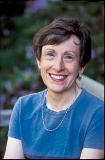
Peggy F. Matthews, a Moravian from Winston-Salem, had waited her whole life for the school to open. She was accepted at Duke Divinity School in the late 1980s, but couldn’t attend because of family obligations and the distance to Durham. At 61, the oldest graduate, she had been involved in community ministry for years, most recently as coordinator of the InterFaith Care Program at the Shepherd’s Center in Winston-Salem. “By attending divinity school, I think I was able to respond to a life-long yearning to go deeper with my faith and examine it in a way only a divinity school can help one do,” said Matthews, who hopes to work as a chaplain in a church-related retirement community. “The yearning has only deepened and raised more questions, and yet, oddly, I feel more at peace than I have my whole life.”
Unlike Matthews, Ann Brinson, a homemaker in High Point, North Carolina, wasn’t waiting for the school to open. “I was surprised when I received my ‘call,’ but no one else was,” said Brinson, who was active in her Presbyterian church, but had never considered the ministry. “I didn’t believe that God actually called people to ministry. I considered ‘calls’ to be either extensions of people’s circumstances or a Biblical phenomena. The intimate presence of Jesus Christ in the daily lives of ordinary people has been profoundly affirmed for me in the last ten years.”
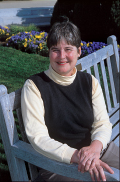
Brinson, 52, said she felt led to small-church ministry even before she enrolled, but Hudgins and others encouraged her to remain open to all possibilities. Even though she graduated still planning to pursue small-church ministry, she said the opportunities provided through the school—class work, internships, mentors, and relationships with faculty and other students—did help “discern where God wants me to be. I discovered some gifts I didn’t know I had and found that I really enjoy preaching. It’s a tremendous responsibility to represent God from the pulpit in a process which can transform lives.”
Brinson interned with Spencer Presbyterian Church in Spencer, North Carolina. All students are required to have an internship their second year, devoting about ten hours a week, in area churches, children’s homes and retirement homes, social service agencies, hospitals, and prison ministries. Many also participated in “mission immersion trips,” traveling to rural Appalachia, New York City, or Cuba to gain experience working with people in diverse settings; some traveled with Leonard to England to study the early Protestant Church of the 16th and 17th centuries. Unlike many other divinity schools, students are required to attend full-time to immerse themselves in their academic work, spiritual formation, and community involvement.
Graduates gave the Divinity School faculty high marks, saying they were challenged daily to consider the basis for their Christian beliefs, to study scripture from new perspectives, and to “wrestle with the deepest, darkest questions about God’s presence in the world,” said Cynthia Lynn Smith, who belongs to the United Church of Christ and hopes to work in pastoral care. Several students said they wished they had had more opportunities to take courses in other schools of the University, as planners of the school had first envisioned, and more opportunities to interact with other students.

Bradley Tharpe, a Baptist and a 1999 graduate of Vanderbilt University, said that the entire experience had better prepared him for ministry. “It gave me a more realistic and balanced view of the church and helped me decide that I wanted to invest my life in congregational work. A friend once told me that if I could find fulfillment in any other career than ministry, then I should choose the other career.” But after three years, Tharpe is right back where he started—seeking to serve a Baptist church. “I don’t expect to leave school and know how to be a minister, but I expect to know how to help myself become a minister and how to continue to develop,” he said.
While the school’s first graduates are preparing for ordination and seeking jobs, fifty rising third- and second-year students will return to the school in August. They will be joined by what will likely be the school’s largest first-year class; thirty-five students had already been accepted by mid-May. Leonard is still planning for enrollment to eventually reach one hundred and thirty-five students, or forty-five in each class. A new professor or two may be hired.
“It’s taken a lot of very hard work, but we’ve really just begun,” Leonard said earlier this spring. “We’re still a work in progress. We’ve learned a great deal about what we want to do, but for the next ten years, assessment will be our constant companion.”
